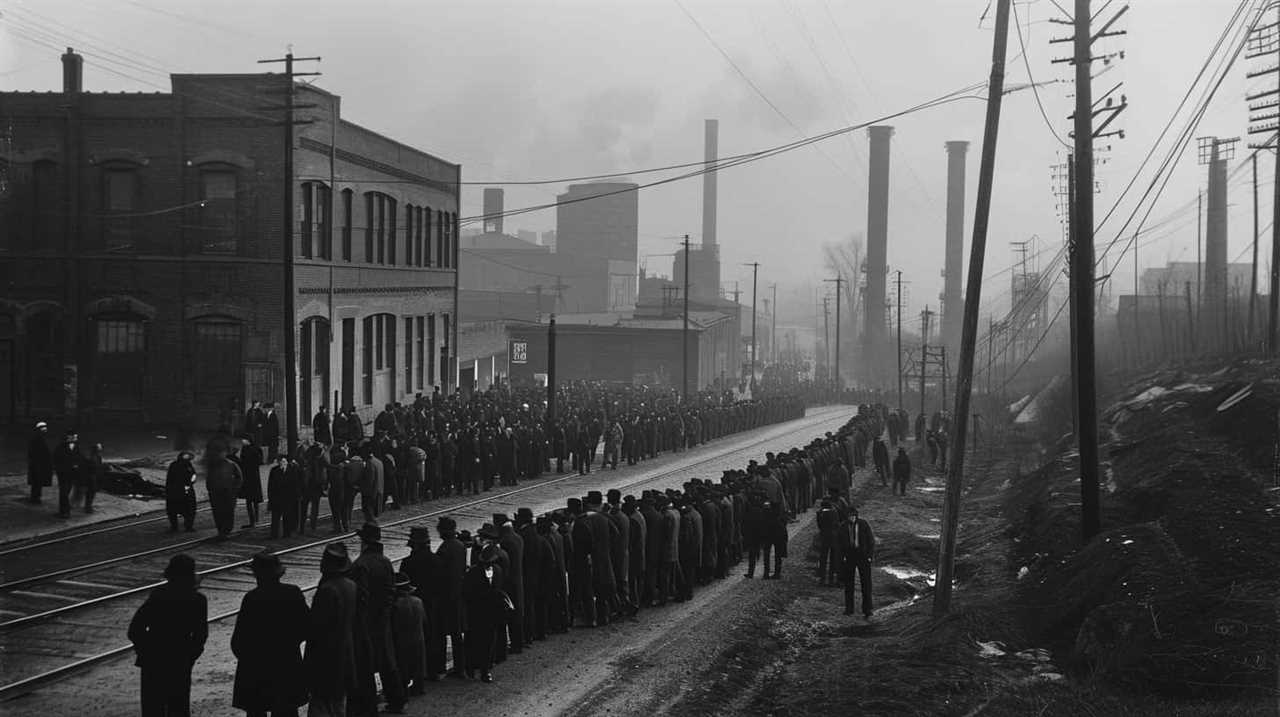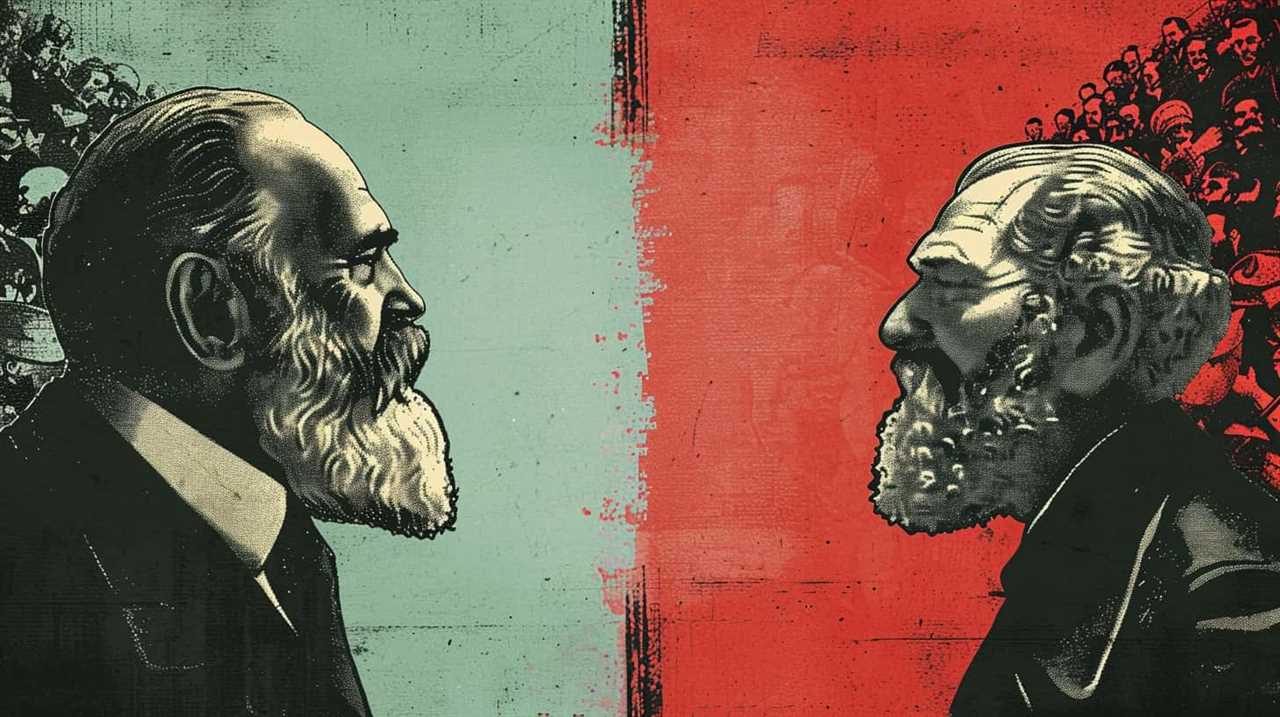Welcome to our exploration of ‘David Ricardo’s Comparative Advantage: Classical Economics Unveiled.’ In this journey, we will delve into the genius of David Ricardo, a prominent figure in classical economics. We will uncover Ricardo’s groundbreaking theory of comparative advantage and its implications for international trade and specialization. Additionally, we will explore how Ricardo’s ideas on free trade and the invisible hand influence modern economic thinking and policy. Get ready to expand your understanding of economics as we unravel the timeless insights of David Ricardo.
By unraveling the intricacies of comparative advantage, we aim to unveil new perspectives and insights that can fuel innovation and progress. Through Ricardo’s theory, we will uncover the hidden potential for specialization and trade, empowering us to make informed decisions in an ever-evolving global economy.
Along the way, we will also address the implications and criticisms surrounding Ricardo’s analysis, fostering critical thinking and stimulating intellectual discourse.
So, let us embark on this enlightening expedition to unlock the timeless wisdom of Ricardo’s comparative advantage and discover the pathways to economic growth and prosperity.

Key Takeaways
- David Ricardo, a British economist, is best known for his theory of comparative advantage.
- Comparative advantage is the ability to produce a good or service at a lower opportunity cost.
- Ricardo’s theory explains why countries engage in international trade and emphasizes the importance of specialization.
- While comparative advantage has its benefits, there are also criticisms and ongoing debates about its application in modern trade theory.
Background on David Ricardo
David Ricardo’s background provides important insights into the development of his theory of comparative advantage. Born in London in 1772, Ricardo was the third of seventeen children in a Sephardic Jewish family. His father was a successful stockbroker, and as a result, Ricardo grew up in a wealthy household. However, he didn’t follow in his father’s footsteps and instead pursued a career in finance and economics.
Ricardo’s contributions to economics were groundbreaking. He’s best known for his theory of comparative advantage, which states that countries should specialize in producing goods in which they’ve a lower opportunity cost and trade with other countries for goods they’ve a higher opportunity cost in producing. This theory revolutionized international trade and laid the foundation for modern trade theory.
Ricardo’s life experiences greatly influenced his economic theories. As a successful stockbroker, he’d firsthand experience with financial markets, which shaped his understanding of how markets function. Additionally, his family’s Jewish background likely influenced his views on free trade and the potential benefits of globalization.
Classical Economics and Its Principles
Building upon the foundation laid by Ricardo’s theory of comparative advantage, we’ll now delve into the principles of classical economics. These principles focus on the idea that individuals and firms act in their own self-interest and that a free-market economy will naturally regulate itself. However, insights from behavioral economics pioneers have challenged some of these assumptions, suggesting that individuals do not always make rational decisions and that market behavior is often influenced by psychological biases. By incorporating these insights, classical economics can be adapted to better understand and predict real-world market behavior.

Classical economics is a school of thought that emerged in the 18th and 19th centuries, focusing on the principles of economic growth and free trade. This approach emphasizes the importance of laissez-faire policies, limited government intervention, and the role of supply and demand in determining prices and allocation of resources.
One of the key principles of classical economics is the belief in the power of free trade. Advocates argue that unrestricted trade between nations promotes economic growth by allowing countries to specialize in the production of goods and services in which they’ve a comparative advantage. This specialization leads to increased efficiency and productivity, which ultimately benefits all participating nations.
Another principle of classical economics is the emphasis on economic growth. Classical economists believe that economic growth is driven by factors such as technological progress, capital accumulation, and investment. They argue that by promoting policies that encourage savings, investment, and entrepreneurship, societies can achieve sustained economic growth and improve living standards.
Understanding Comparative Advantage
Our understanding of comparative advantage is crucial in grasping the principles of classical economics. Comparative advantage refers to the ability of a country, individual, or firm to produce a particular good or service at a lower opportunity cost than others. This concept is essential in understanding the benefits of trade and specialization.

One of the advantages of comparative advantage is the potential for increased efficiency. When countries specialize in producing goods and services in which they’ve a comparative advantage, they can allocate their resources more efficiently. This leads to higher productivity and output, benefiting both the trading partners involved.
Another advantage of comparative advantage is the potential for increased economic growth. By focusing on producing goods and services in which they’ve a comparative advantage, countries can tap into their inherent strengths and become more competitive in the global market. This can lead to increased exports, job creation, and overall economic prosperity.
However, there are also disadvantages to consider. Comparative advantage can lead to dependency on other countries for certain goods and services. If a country relies too heavily on imports, it may become vulnerable to supply disruptions or price fluctuations in the global market.
In summary, understanding comparative advantage is crucial in understanding the principles of classical economics. It allows countries to specialize in the production of goods and services in which they’ve a comparative advantage, leading to increased efficiency and economic growth. However, it also comes with potential disadvantages, such as dependency on other countries for certain goods and services.

Transitioning into the next section, let’s now explore David Ricardo’s theory of comparative advantage.
Ricardo’s Theory of Comparative Advantage
Now let’s delve into Ricardo’s theory of comparative advantage, which elucidates the concept of comparative advantage in classical economics. Ricardo’s theory explains why countries engage in international trade and how they can benefit from it. According to Ricardo, a country should specialize in producing goods or services in which it has a lower opportunity cost compared to other countries.
Opportunity cost refers to the value of the next best alternative forgone when choosing one option over another. In the context of international trade, it represents the amount of a good or service that a country must give up in order to produce more of another good or service. Ricardo argued that countries should focus on producing goods or services in which they’ve a lower opportunity cost, and then trade with other countries to obtain those goods or services in which they’ve a higher opportunity cost.
Implications and Criticisms of Ricardo’s Analysis
Upon analyzing Ricardo’s analysis, we discovered several implications and criticisms regarding his theory of comparative advantage.

One implication of Ricardo’s theory is that it suggests that countries should specialize in the production of goods in which they’ve a comparative advantage. This can lead to increased efficiency and productivity, as countries can focus on producing goods that they’re able to produce at a lower opportunity cost. Additionally, by engaging in international trade based on comparative advantage, countries can benefit from the gains of trade and increase their overall welfare.
However, there are also criticisms of Ricardo’s analysis. One criticism is that the theory assumes that resources are perfectly mobile between industries within a country, which may not always be the case in reality. Factors such as labor immobility, capital immobility, and technological barriers can limit the ability of countries to fully exploit their comparative advantages.
Another criticism is that the theory assumes that there are constant returns to scale, meaning that the production of goods can be increased without limit. In reality, there may be diminishing returns to scale, which can affect the optimal allocation of resources and the potential gains from trade.
Frequently Asked Questions
What Were David Ricardo’s Major Contributions to Classical Economics Besides His Theory of Comparative Advantage?
David Ricardo’s contributions to classical economics were significant. Besides his theory of comparative advantage, which revolutionized international trade, he faced challenges to his ideas and influenced economic policies in the 19th century.

How Did David Ricardo’s Theory of Comparative Advantage Impact International Trade?
Ricardo’s theory of comparative advantage revolutionized international trade by highlighting the benefits of specialization and trade between nations. Its impact on global trade has been immense, and Ricardo’s influence on economic theory continues to shape modern trade policies.
Can You Provide Examples of Countries That Have Benefited From Implementing Ricardo’s Theory of Comparative Advantage?
Examples of countries benefiting from Ricardo’s theory of comparative advantage include Japan and South Korea. These countries have successfully implemented policies that focus on their respective areas of expertise, leading to economic growth and global competitiveness.
Are There Any Modern Economists Who Have Challenged or Revised Ricardo’s Theory of Comparative Advantage?
Modern challenges to Ricardo’s theory and revisions to comparative advantage have emerged from economists seeking innovation. However, it is important to consider that even the most esteemed theories can be subject to scrutiny and improvement.
How Did David Ricardo’s Theory of Comparative Advantage Influence the Development of Economic Policies in the 19th Century?
David Ricardo’s theory of comparative advantage had a profound influence on economic policies in the 19th century. It shaped nations’ decisions on trade and specialization, leading to increased global economic integration and fostering a more interconnected world economy.

Conclusion
Ricardo’s theory of comparative advantage, a cornerstone of classical economics, unravels the complex dynamics of international trade. By focusing on each nation’s strengths and weaknesses, Ricardo demonstrates how specialization and free trade can benefit all parties involved.
While his analysis has faced criticisms, such as neglecting the impact on income distribution, Ricardo’s insights remain vital in understanding the fundamental principles of trade and the potential for global economic growth.
Through Ricardo’s visionary lens, the world of economics becomes enlightened, expansive, and economically enriching.









